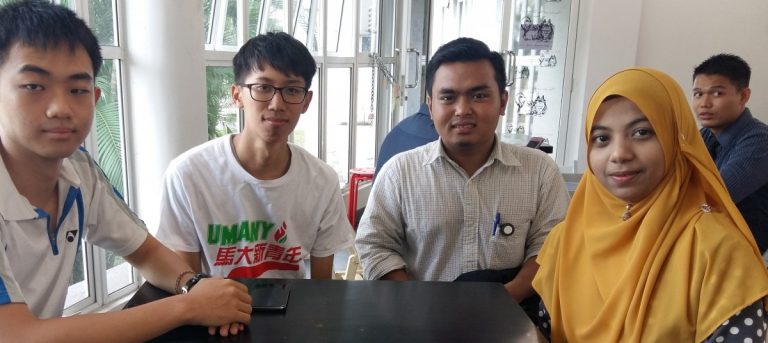
Malaysia is under a year away from its 14th General Election, a political contest that will be held amid an increasingly turbulent political atmosphere and while international backlash from the 1Malaysia Development Berhad (1MDB) scandal continues unfettered.
Against this backdrop, the country’s student leaders are preparing for an uncertain future. They know full well the crucial role this particular race will play in mending old wounds – the last two federal contests resulted in a Malaysia wracked by racial, religious and ideological divisions.
Battle-hardened and better-equipped with knowledge, Malaysia’s student cohort – a key voter demographic in this country of over 31 million – has come up with a plan that could spark the much-needed change in their nation’s political dynamics.
Introducing the “student manifesto” by Kesatuan Mahasiswa Malaysia (loosely translated as the Coalition of Malaysian Student Unions), a student-founded and student-led movement comprising groups from 13 universities across the Muslim-majority country.
Their strategy this time rests squarely on this manifesto, a soon-to-be unveiled non-partisan document listing the demands of Malaysian students from their varsities and their nation.
Neutral ‘third force’

Anis speaks in front of a crowd gathered during a candlelight vigil for a prominent activist who was detained under a controversial anti-terrorism law. Pic: Facebook/
In a nutshell, these students want more funds for their universities and better care for citizens.
Yes, these calls are not new and yes, these student leaders know it. In the 2013 election, their seniors had raised the same issue of haphazard education policies and broader electorate concerns under the opposition party’s banner.
But what’s different this time is they are taking a resolute (albeit difficult) stand of treading the middle ground, to be the neutral “third force”.
This means when the election rolls around, Kesatuan members will not directly throw their weight behind any political party, be it the ruling Barisan Nasional (National Front) or the opposition’s Pakatan Harapan (Pact of Hope).
Kesatuan chairman Anis Shafiqah, who is the current face of student rebels in Malaysia, says:
“The political landscape is now different. With the opposition in chaos, we have decided to not add to it.”
Instead, they will present their soon-to-be finalised manifesto for any party to endorse.
Topping their list of demands is a request to boost funding for the higher education sector – Malaysia’s higher education budget for 2017 was slashed by 19 percent or the equivalent of RM1.5 billion.
According to students, the cut has since left, among others, the campus short of teachers to conduct classes. For some of the lectures that still go on, students sit on broken chairs – there isn’t enough money to replace them.
Fees are on the rise, too. “When the budget was cut, students have to foot the bill,” says Mohd Luqman Hakim Fazli, one of the coalition’s leaders and University of Malaya’s Islamic Association president.
While the coalition is not overtly promising votes in return, they can assure their political backers of “mileage” with the youth population. For a country where the median age is 28, this “mileage” may go a long way for poll contenders.
Luqman also points out, in unveiling the new National Transformation 2050 (TN50) – Prime Minister Najib Razak’s 30-year plan for the country after 2020 – he had promised to listen to the country’s people and youths from all walks of life.
“Well, our manifesto lists our needs. If this national transformation is genuine, he (Najib) has to adopt this manifesto. If not, what he says is mere rhetoric,” Luqman says.
‘Political fatigue syndrome’, ‘culture of fear’
What created this distrust in the current political machinery has been characterised as the local youth’s “political fatigue syndrome”, a condition driven by political crises occurring among parties on both sides of the political divide and how each player has “vested interests”.
Although emboldened by Hong Kong’s Umbrella Movement and the role Indonesian students played in pushing for the fall of then-president Suharto, their less inspired peers on this side of the world have grown tired of keeping up with local politics.
Instead of searching for common ground to advance their concerns, a generation that should have boundless energy is now divided by traditional party-driven politics.
But Kesatuan’s members have not lost hope.
University of Malaya’s Association of New Youth secretary-general Lau Li Yang says students now prefer “neutrality and impartiality”.
This in mind, the student leaders will be touring public and private campuses, and setting up voter registration booths to raise awareness in the months leading up to the 14th General Election. And like their peers in Hong Kong, social media will be their foremost weapon of choice to advocate their cause.
“It is the best medium to reach the youth and students. Not everyone cares if you hold a press conference,” says Luqman.
But despite being a screen-obsessed nation, they concede the digital medium that spurred the Arab Spring may face a tough time against the culture of fear and apathy that still permeate Malaysia’s universities.

Student activist Asheeq Ali of the National University of Malaysia condemns Anis’ arrest just before a large protest calling for free and fair elections were scheduled to take place. Source: Facebook/@Kesatuan Mahasiswa Malaysia.
Lau, Anis and Shafiq have all been charged and fined by their university for speaking up against the prime minister and his alleged involvement in the 1MDB controversy. Just hours before a highly-anticipated rally calling for Najib’s resignation in Kuala Lumpur last year, Anis and a host of other activists were arrested by police.
Yet, they remain hopeful and determined despite, and in anticipation of, further intimidation tactics like these.
“We are scared, too. But we want to take responsibility. If not us, who else?,” says Luqman.
Liked this? Then you’ll love these…
Charges on Malaysian students for dissent show region-wide cancer on free speech







